Published in Nacional number 649, 2008-04-22
Interview
Sanja Jovanovic – World record holder grew up on cornmeal and water
THE SWIMMING ACE talks about her athletic success, the difficult beginnings of her career, her childhood and life in poverty in Dubrovnik and her plans for the future
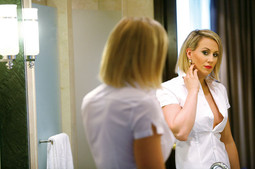 Despite her swimming talent, 21-year old Sanja Jovanovic struggled for years without money, sponsors or equipment, and travelled a painstaking road to successFor years Sanja Jovanovic (21) was considered the greatest hope in Croatian women's swimming, but up until last year it was not clear whether her talent for swimming would ever prove itself good enough for European and international success. And while she swam at the Olympic Games in 2004, as a 17-year-old, and that same year placed third at the European Championships in Madrid in the 200 metre backstroke event, the very next year she entered a period of crisis that led her to consider pulling out of swimming. It was only after she began working with Dmitar Bobev, a Bulgarian swimming coach who has lived in Croatia for years, that she started getting results. Last year she took the gold medal at the 50 metre backstroke and silver at the 100 metre backstroke at the European 25-metre pool championships in Debrecen, and she recently snatched up a gold medal in Manchester at the world small pool championship and set a new world record in the 50 metre backstroke, and won a bronze medal in the 100 metre backstroke event.
Despite her swimming talent, 21-year old Sanja Jovanovic struggled for years without money, sponsors or equipment, and travelled a painstaking road to successFor years Sanja Jovanovic (21) was considered the greatest hope in Croatian women's swimming, but up until last year it was not clear whether her talent for swimming would ever prove itself good enough for European and international success. And while she swam at the Olympic Games in 2004, as a 17-year-old, and that same year placed third at the European Championships in Madrid in the 200 metre backstroke event, the very next year she entered a period of crisis that led her to consider pulling out of swimming. It was only after she began working with Dmitar Bobev, a Bulgarian swimming coach who has lived in Croatia for years, that she started getting results. Last year she took the gold medal at the 50 metre backstroke and silver at the 100 metre backstroke at the European 25-metre pool championships in Debrecen, and she recently snatched up a gold medal in Manchester at the world small pool championship and set a new world record in the 50 metre backstroke, and won a bronze medal in the 100 metre backstroke event.
But to achieve her international swimming success, Sanja Jovanovic had to endure her own Golgotha. Her family, mother and three sisters fled from Mokosica during the war to seven kilometres distant Dubrovnik. Her father fled to Germany, and they were put up as refugees in Dubrovnik hotels. And although it quickly became evident that Sanja was an exceptionally talented swimmer, she struggled for years, without money, athletic equipment and sponsors.
Hard earned success
Sponsors offered help after Ivan Sprlje, a former Dubrovnik-Neretva County Prefect, began championing her cause, especially after the B4 Sport Academy, an institution that looks after young and talented athletes, took an active interest in her. The only problem is in finding swimming coaches, in short supply in Croatia, but since she has been working with Dmitar Bobev, Sanja Jovanovic is no longer troubled by athletic obstacles. Her private troubles have not, however, disappeared as her mother Marija has for some time suffered from breast cancer.
NACIONAL: Although everyone is celebrating your 25 metre pool gold medal and world record in Manchester, you have to admit that in the swimming scene success in 25 metre pools does not rates as highly as the results in 50 metre pools.
- Fine, then I will set the world record in a 50 metre pool too and then everyone will think better of me. But sincerely, the record does in fact mean a whole lot as all of the competition was in Manchester. The only one who did not show was American Natalie Coughlin, but all of the remaining top "backstrokers" were in Manchester so that I was up against very stiff competition. That is why I am able to say that I am on top, that I am the best at the 50 metre backstroke, while in the 100 metre backstroke I am somewhere between third and fourth spot. And as far as results in 50 metre pools is concerned, there is still plenty of time to break world records there. And I am leaving that for later; now that I have broken the record in small pools I would like to break the world record in the 50 metre backstroke in a big pool too.
NACIONAL: Are new records and medals at the Olympic Games in Beijing the top goal for you and your trainer Dmitar Bobev given that no one now expects less?
- I discuss everything with Bobev, including the fact that there will be crises and drops in the results, which is normal. I have already been through it all three years ago, although I do not think I shall again go through a crisis like that. Bobev and I often discuss medals and records, sometimes I even badger him on the subject, and then Bobev tells me to settle down and that it is no good to put that kind of pressure on myself. As a little kid that was the way I though and spoke, but there was nobody there to tell me to stop. I also gave those kinds of statements because I am a naturally optimistic and simple person. As a child I liked to set goals, but as I have grown older I understand that I will only achieve these goals if I work hard and well at it. That si why I say now that my goal for the Olympic Games is to make it to the finals, to be among the top eight.
NACIONAL: You mentioned the time when you were a little girl. At what age did you take up swimming?
- It was in 1995 when I was nine years old and when people noticed my talent. We went to a pool with the school, swam and they told me then that I was a tremendously talented swimmer, upon which I decided to take up swimming. As my mother, sisters and I lived in less than ideal conditions, I grasped that I had to help my family and get them out of poverty so that, scooping through the water, I considered how I might bring that about, to make it better for myself and for them, and how my swimming could get us out of our troubles. The first money came later, the first medals, getting to know people who helped me out. The person who helped me the most was the late Ivan Sprlje. I was deeply stricken last year by his death. He was always in my thoughts when I travelled to European and international swim meets. When we were living in the hotel as refugees my eldest sister Petkana worked, and still works, as a pastry chef at the Excelsior hotel, for Goran Strok. One time, in 1999, she met Ivan Sprlje at the hotel and told him of the situation I was in. He could not believe what was happening and said: "You deserve help." He was a beautiful person, always there to help us, insisting that our house be rebuilt. That is why Goran Strok told me a few days ago that Ivan Sprlje would be the happiest person in the world today on account of my success. I guess God takes those that have a soul, those he needs the most; he takes the good people.
Two kuna for a doughnut
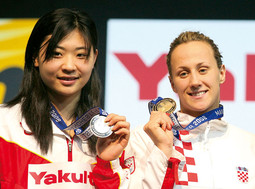 Sanja Jovanovic with the gold medal she won on the 50m backstroke at the World Championships in Manchester; Gao Chang from China took second placeNACIONAL: You started at the age of nine and the next four to five years were certainly marked only by hard work, without and lucrative success. How did you make it through those years?
Sanja Jovanovic with the gold medal she won on the 50m backstroke at the World Championships in Manchester; Gao Chang from China took second placeNACIONAL: You started at the age of nine and the next four to five years were certainly marked only by hard work, without and lucrative success. How did you make it through those years?
- Even more, there were six or seven years of very hard work without any earnings. I remember that after morning practice all the kids got a drive home from their parents, and since my mother did not have a car, I would stay at the pool and sleep until the afternoon training. My mother did not even have enough for running shoes, or for other equipment, but all this has only made me stronger and taken me to the top. I remember my first grant, it was for 600 kuna, funny, but it made me very happy because I could take that money home and say to my mother "here, buy us something for lunch".
NACIONAL: Given the massive sacrifices swimming demands did your mother agree right away with your wish to become a professional swimmer?
- She was a big support from day one and always encouraged me. I remember that, when I was not very eager to go to practice, she would say "I'll give you two kuna so you can buy yourself a doughnut and then go to practice". She knew how to win me over because I was always asking for two kuna so I could get myself a doughnut. So she would bribe me with doughnuts to get me to go to practice. But it was never a chore for me to go to training; it never happened that I would not go to the pool to play with other kids. Right away I felt a great love for swimming and a great desire to be a successful swimmer and so to help my family.
A swimming phenomenon
NACIONAL: How was it, besides all this, to live without the father who abandoned you?
- For me that book is shut. I do not like to talk about him because in 1992 he went his way and we have been living without him since then. My life is my mother and my three sisters, that is all I have to say about my father.
NACIONAL: A special diet is needed for a swimmer's development. How did you manage if you hardly had enough for basic nutrition at the refugee hotel?
- It was that precisely that drove me on to success, because I wanted a hot meal, a car and a warm home, like everyone else. That made me stronger, it was the fundamental motive. During the toughest moments I got help from the B4 Sport Academy and I have to thank Robert Josip Manestar, the director of the academy, who saw some talent in me even before the Academy, which provides assistance to young athletes, was launched. He helped me out when I was 14, 15 years old, and he continues to help me now, when my mother is seriously ill. On the other hand, there were a lot of people who told me that I had short hands and short legs and that I would never amount to much. They were wrong, and I have shown to all those people that I am the best swimmer and that I will be even better. On the other hand, there were also those who were by my side. Coach Bobev told me: "When I saw you as a little kid and when I saw how short your legs were, I immediately knew that you would be a swimming phenomenon." People still josh me to this day saying that I have short arms and short legs, but I never paid any attention to that because I knew that these short arms and short legs whip through the water, and that their long arms and long legs do not.
NACIONAL: How did the B4 Sport Academy help you?
- Before the Academy was founded Robert Josip Manestar found sponsors for me, from the first one, which was the Vocko Company, right up to my personal sponsor, the Hidrocommerce Company. The Academy has helped me out in everything, from athletic equipment and vitamins on. All of the people at the Academy are my second family, they are with me round the clock.
NACIONAL: Before Dmitar Bobev became your coach you had problems with coaches. What in fact was going on?
- Bobev started working with me in 2006, after the European championships in Budapest. Before that, after my appearance at the Olympic Games in 2004, there was a change of coaches. Up to then I had been coached by Klara Siljeg.
NACIONAL: It looks like that is also something you do not like to talk about.
- It's not that I don't like to discuss it, but 2005 was a year in which everyone was philosophising, and nobody was helping me. There was wheedling going on behind my back to end my association with Klara Siljeg. I do not know what exactly happened, I wish her all the best in life. I always call her, we have a coffee, I have never had anything against her. Some things were going on behind my back, however. Now I am fine, I always leave the bad memories in the past. After Klara Siljeg I was coached for a short period by the young and inexperienced coach Josko Turk, who is not to blame for anything. Someday he can become a good coach. And then Dmitar Bobev showed up and right away I knew I had come into the hands of a professional.
Offers from the USA
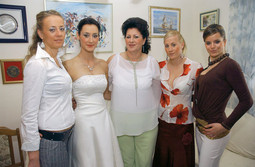 Sanja Jovanovic and her familyNACIONAL: During that critical 2005 there was word that you wanted to get out of swimming.
Sanja Jovanovic and her familyNACIONAL: During that critical 2005 there was word that you wanted to get out of swimming.
- Yes, I intended to stop swimming. I was in despair over the entire situation, because no one was helping me and I was just about ready to give it up. I was a child, I had no background in wealthy parents who would take care of me, and all together it broke me. But then the people from the B4 Sport Academy showed up and told me I would not give up swimming. When Bobev showed up and my mother fell ill I became another person. I have matured as a person, I can think for myself, I know what I want out of life. After the Olympic Games I want to enrol in economics at university. I have finished commercial secondary school and want to further my education. First I will enrol in a foreign English language school and then university.
NACIONAL: However tough it was for you, you have been known to confess that coach Bobev had a hard time with you too.
- During the first months it really was difficult for him. Not only was I not ready for his method of working, but I was also not ready for his behaviour. A lot of work had to be done on me and he succeeded in that. First he wanted to sit down and talk with me and then get to work. Before that I had no idea how to discuss something and say what was on my mind. Now I know, when something is bothering me I say: "Look Bob, this is what is bothering me, can you help me?", because we understand each other now. And then there is his way of working. Ever since I have been working with Bobev I have lost seven kilos, I do quality workouts in the weight room, I eat quality food, which is important, and do quality training sessions. Bobev has dedicated his time to me round the clock in order to teach me all this. No there are no more problems between us, we work together super, we understand one another, he knows when I am nervous, I now when he is nervous.
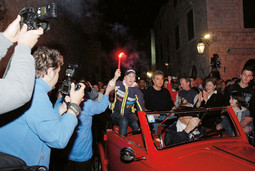 Dubrovnik gave Sanja a tremendous greeting after winning the gold medal NACIONAL: Dropping seven kilos is not an insignificant and unimportant thing in swimming.
Dubrovnik gave Sanja a tremendous greeting after winning the gold medal NACIONAL: Dropping seven kilos is not an insignificant and unimportant thing in swimming.
- It is not, it was tough, but I had to do it if I wanted to be in top class swimming. I used, for example, to eat a lot of pastries, which he forbade. Bobev is very angry when he sees that I have eaten bad food. Now I have order and I know when I can eat what foods, right away I came to terms with not eating pastries. I do not like it, but I know that it is for my own good. We would not have succeeded if he had not been like that with me. As far as the swimming itself goes, and the technique, here too sitting down and talking with Bobev is the key thing. With him I work at a much higher level, I work on my technique, the training sessions are longer. I have become a different person.
NACIONAL: Bobev recently decided to move from Rijeka to Dubrovnik. Did he do so at your behest?
- He did not; I did not try to persuade him to do so. Our relationship worked just as well before, when I moved to from Dubrovnik to Rijeka to work with him. I spent a year in Rijeka and it was super. I adjusted quickly, the people are very amiable, I lived on my own. You learn a lot when you live on your own, washing, cooking, cleaning up, while is a big bonus in my life. It worked wonderfully, but a person needs a change. I am very happy that he has come to Dubrovnik.
NACIONAL: As a talented swimmer have you received offers to go to the USA to study, as did Duje Draganja and Gordan Kozulj?
- Yes, two year ago many universities in the US called me, but America has never attracted me. I felt that I could become a top-ranking swimmer in Croatia too. The advantage America offers is that you can graduate from an excellent university and train while doing so, while in Croatia it is different. Hats off to Draganja, Kozulja and the others, they have graduated from university, are mature individuals who train hard, have results, but still I do not pine for America. I am 21 years old and will now enrol in university. It's not that I have not considered the offers from the US, I just ended up not accepting them.
Star status
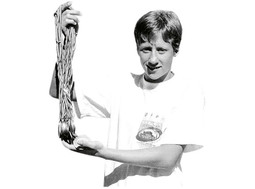 In her youth Sanja Jovanovic beat out her junior competitorsNACIONAL: Successful swimmers are increasingly better paid. What is your current financial situation?
In her youth Sanja Jovanovic beat out her junior competitorsNACIONAL: Successful swimmers are increasingly better paid. What is your current financial situation?
- Swimming was never a place to make big earnings. That is why I am grateful to Croatia Government which has rewarded our success with nice monetary awards. But swimmers cannot earn enough for their entire lives like some other athletes are able to. As far as I am concerned I feel I can earn more, and there are many potential sponsors coming forward now, and I suppose I shall get some new sponsors. I still live with my sisters and mother in Mokosica, in our reconstructed house, and Dubrovnik Mayor Dubravka Suica is doing what she can to see that I get an apartment in Dubrovnik.
NACIONAL: Two years ago you also received public attention when your twin sister Tanja took part in the Big Brother reality show. What is your opinion of this move on her part?
- My sister is responsible for herself, as am I for myself. I never liked it and I would never have done it because it is not something that would interest me. Taking part in Big Brother did not open any new opportunities for her, what is more some opportunities, because of Big Brother and what she was doing there, were shut to her. But it is her choice, although I would never have done it. She also works as a pastry chef and we are hoping she can make a career as a singer, something she dreams of.
NACIONAL: Do you now enjoy star status in Dubrovnik?
- I have never felt like a star. Nobody is a star, we are all just ordinary people, its just that we do something that is of interest to the public. I do what I do out of love, not for the popularity associated with it. I do not like to play the star, to be conceited, I like to converse with anyone. I am open and have a positive attitude towards everyone.
'I slept on a plank for seven years as a refugee' NACIONAL: What did you and your family live off when you first got into swimming? I slept seven years in the Vis hotel, on a plank covered by a blanket so that it would be at least a little softer. The conditions were catastrophic, there was no money and life was terribly hard for us. When I travelled for competitions there was cornmeal or meat spread in my sandwich. I did not get salami or ham like the other kids. I went on trips in running shoes that were falling apart and the other kids would make fun of me. I cried because of that and told my mother that I would never swim again.
- On nothing, we lived off processed meat spreads. We were refugees, lodged in hotels in Dubrovnik where we had breakfast, lunch and dinner. First we were put up in the Argus hotel, then at the Plakir, and finally to the Vis. We moved three times between refugee hotels. There was no hot water so we boiled some in pots, there was no clothes washing machine so we washed everything by hand. I saw rats every day.
Biography
- Born in Dubrovnik on 15 September 1986
- Starts her swimming career in 1995, at the age of nine
- Appeared at the 2004 Olympic Games in Athens and took third spot in the 200 metre backstroke at the European championships in Madrid
- In 2006 Dmitar Bobev takes over as her coach
- Took the gold medal in the 50 metre backstroke and silver in the 100 metre backstroke in 2007 at the European championships in 25-metre pools in Debrecen
- Won a bronze medal in 2008 at the European championships in big pools held in Eindhoven in the 50 metre backstroke event, and went on to win gold in Manchester at the small pool world championships, setting a new world record in the 50 metre backstroke and also taking the bronze in the 100 metre backstroke event
- Lives in Mokosica with her mother and three sisters
Latest news
-
28.10.2010. / 14:15
'A profitable INA is in everyone's interest'
-
28.10.2010. / 09:38
Sanader’s eight fear SDP — Won’t bring down Government
-
21.10.2010. / 15:02
Interior Ministry turned a blind eye on Pukanic assassination
-
20.10.2010. / 09:34
Barisic could bankrupt HDZ



